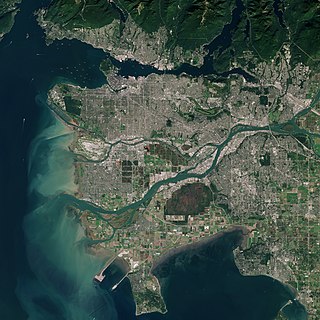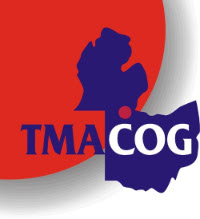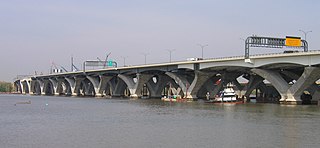
Denver is the central city of a conurbation region in the U.S. state of Colorado. The conurbation includes one continuous region consisting of the six central counties of Adams, Arapahoe, Broomfield, Denver, Douglas, and Jefferson. The Denver region is part of the Front Range Urban Corridor.

Arlington County, or simply Arlington, is a county in the U.S. state of Virginia. The county is located in Northern Virginia on the southwestern bank of the Potomac River directly across from Washington, D.C., the national capital.

Washington, D.C., formally the District of Columbia and commonly called Washington or D.C., is the capital city and federal district of the United States. The city is on the Potomac River, across from Virginia, and shares land borders with Maryland to its north and east. Washington, D.C., was named for George Washington, a Founding Father and the first president of the United States. The district is named for Columbia, the female personification of the nation.

The Metro Vancouver Regional District (MVRD), or simply Metro Vancouver, is a Canadian political subdivision and corporate entity representing the metropolitan area of Greater Vancouver, designated by provincial legislation as one of the 28 regional districts in British Columbia. The organization was known as the Regional District of Fraser–Burrard for nearly one year upon incorporating in 1967, and as the Greater Vancouver Regional District (GVRD) from 1968 to 2017.

The Metropolitan Council, commonly abbreviated Met Council or Metro Council, is the regional governmental agency and metropolitan planning organization in Minnesota serving the Twin Cities seven-county metropolitan area, accounting for over 55 percent of the state's population.

The Washington–Baltimore combined metropolitan statistical area is a statistical area including the overlapping metropolitan areas of Washington, D.C. and of Baltimore. The region includes Central Maryland, Northern Virginia, three counties in the Eastern Panhandle of West Virginia, and one county in south-central Pennsylvania. It is the most educated, highest-income, and third-largest combined statistical area in the United States behind New York City–Newark, NJ and Los Angeles–Long Beach.
Councils of governments are regional governing and/or coordinating bodies that exist throughout the United States. CoGs are normally controlled by their member local governments, though some states have passed laws granting CoGs region-wide powers over specific functions, and still other states mandate such councils.

Northern Virginia, locally referred to as NOVA or NoVA, comprises several counties and independent cities in the Commonwealth of Virginia in the United States. The region radiates westward and southward from Washington, D.C. With 3,257,133 people as of 2023 U.S. Census Bureau estimates, the region includes 37.37 percent of Virginia's total population. It is the most populous region of both Virginia and the Washington metropolitan area.

The Washington Metropolitan Area Transit Authority, commonly referred to as Metro, is a tri-jurisdictional public transit agency that operates transit service in the Washington metropolitan area. WMATA was created by the United States Congress as an interstate compact between Washington, D.C., Maryland, and Virginia.

Maryland Route 200, also known as the Intercounty Connector or ICC, is an 18.8-mile (30.3 km) controlled-access toll road in the U.S. state of Maryland. It connects Gaithersburg in Montgomery County and Laurel in Prince George's County, both of which are suburbs of Washington, D.C. The ICC was one of the most controversial Maryland road projects; opposition to the highway stalled the project for decades, and construction did not begin until 60 years after the highway's initial approval.

A Metropolitan Planning Organization (MPO) is a federally mandated and federally funded transportation policy-making organization in the United States that is made up of representatives from local government and governmental transportation authorities. They were created to ensure regional cooperation in transportation planning. MPOs were introduced by the Federal-Aid Highway Act of 1962, which required the formation of an MPO for any urbanized area (UZA) with a population greater than 50,000. Federal funding for transportation projects and programs are channeled through this planning process. Congress created MPOs in order to ensure that existing and future expenditures of governmental funds for transportation projects and programs are based on a continuing, cooperative, and comprehensive ("3-C") planning process. Statewide and metropolitan transportation planning processes are governed by federal law. Transparency through public access to participation in the planning process and electronic publication of plans now is required by federal law. As of 2015, there are 408 MPOs in the United States.

The Washington metropolitan area, also referred to as the DC area, Greater Washington, the National Capital Region, or locally as the DMV, is the metropolitan area centered around Washington, D.C., the federal capital of the United States. The metropolitan area includes all of Washington, D.C. and parts of Maryland, Virginia, and West Virginia. It is part of the larger Washington–Baltimore combined statistical area, which is the third-largest combined statistical area in the country.

The Capital Area Food Bank is the largest organization in the Washington metro area working to solve hunger and its companion problems: chronic undernutrition, heart disease, diabetes, and obesity. By partnering with over 450 community organizations in the District of Columbia, Maryland, and Virginia, as well as delivering food directly into hard to reach areas, each year the Capital Area Food Bank is helping nearly half a million people each year get access to good, healthy food.

The Toledo Metropolitan Area Council of Governments (TMACOG) is a voluntary organization of dues-paying members. TMACOG members include governmental and non-governmental organizations in northwest Ohio and southeast Michigan: cities, counties, villages, and townships, as well as schools and colleges, park districts, businesses, and other groups concerned with quality of life in the region. TMACOG is both a regional council and a metropolitan planning organization.

The Denver Regional Council of Governments is a nonprofit membership organization of local governments in the Denver region of the US state of Colorado. DRCOG is the designated metropolitan planning organization (MPO) and the Transportation Planning Region (TPR) for the region, as well as the Area Agency on Aging (AAA).
The Chicago Metropolitan Agency for Planning (CMAP) is a metropolitan planning organization (MPO) responsible for comprehensive regional transportation planning in Cook, DuPage, Kane, Kendall, Lake, McHenry and Will counties in northeastern Illinois. The agency developed and now guides implementation of ON TO 2050, a new long-range plan to help the seven counties and 284 communities of northeastern Illinois implement strategies that address transportation, housing, economic development, open space, the environment, and other quality-of-life issues.
The Puget Sound Regional Council (PSRC) is a metropolitan planning organization that develops policies and makes decisions about transportation planning, economic development, and growth management throughout the four-county Seattle metropolitan area surrounding Puget Sound. It is a forum for cities, towns, counties, transit agencies, port districts, Native American tribes, and state agencies to address regional issues.
A metropolitan economy refers to the cohesive, naturally evolving concentration of industries, commerce, markets, firms, housing, human capital, infrastructure and other economic elements that are comprised in a particular metropolitan area. Rather than the definition of distinct urban and suburban economies that evolve and function independently, a metropolitan economy encompasses all interdependent jurisdictions of particular regional clusters. This type of economy has all its units functioning together in a trans-boundary landscape that often crosses city, county, state, province, and even national lines. Metropolitan economies expand from the parochial view taken in urban economics which focuses entirely on a city's spatial structure, and broadens it into a metropolitan's spatial and social/economic structure.

The Northern Virginia region is served by numerous mediums of transit. Transportation in the region is overseen by the Northern Virginia Transportation Commission and the Northern Virginia Transportation Authority.
Walter A. Scheiber played an influential role in the development of regional government in the United States, as the first executive director of the Metropolitan Washington Council of Governments (1966-1991). During his leadership of the council, he led a number of cooperative regional initiatives on issues including air and water pollution, housing and cooperative purchasing; his advocacy to Congress helped support the creation of the Metro transit system in the Washington, D.C. area. The Washingtonian called him "the primary architect of regional planning and cooperation in Washington." On his retirement in 1991, a Washington Post editorial referred to him as a "'consummate professional, a superb diplomat,'" who was "held in the highest regard by professional colleagues across the country." He played a key role in founding the National Association of Regional Councils (NARC) and, having spent a decade before joining MWCOG as a city manager, was very active in the International City and County Management Association (ICMA).














